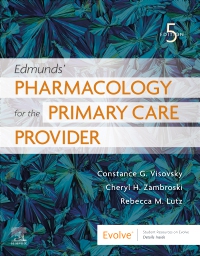
Edmunds' Pharmacology for the Primary Care Provider - Elsevier eBook on VitalSource, 5th Edition
Elsevier eBook on VitalSource

Now $108.29
Master the pharmacologic principles and drug information you need to safely and effectively prescribe drugs for primary care! Edmunds' Pharmacology for the Primary Care Provider, 5th Edition is written for Nurse Practitioners, other Advanced Practice Nursing prescribers, and Physician Assistants. Unlike other pharmacotherapeutics textbooks, it focuses on the drugs most commonly used in primary care settings. A new chapter format and body-system approach make learning easier, and standardized clinical guidelines ensure best practices in pharmacotherapeutics. Updated and impeccably accurate drug content includes the latest drug classes, specific drugs, and therapeutic uses in primary care. Continuing to emphasize health promotion strategies, this new edition includes new chapters on pharmacogenetics, drugs for ADHD, nutritional supplements, and more.
Newer Edition Available
Pharmacology for the Primary Care Provider - Elsevier eBook on VitalSource
-
- Comprehensive pharmacotherapeutics content is written specifically for Nurse Practitioners, other Advanced Practice Nurses, and Physician Assistants
- Focus on key drugs highlights the most commonly prescribed and most representative drugs of each major drug class — with particular emphasis on the top 100 prescribed drugs
- Emphasis on patient teaching helps you communicate with patients and family caregivers to promote adherence to the drug regimen
- Emphasis on health promotion describes how to help patients stay well and improve their health, including coverage of vitamins, weight management, immunizations and biologicals, and smoking cessation
- Complementary and Alternative Therapies tables highlight significant dietary and herbal interactions with FDA-approved drugs
-
- NEW! Thoroughly updated content reflects the latest drug information and current thinking on pharmacologic management
- NEW macro- and chapter-level organization is based on body systems rather than drug classes, for better coverage of the medications prescribed for the health problems affecting specific body systems
- NEW and UNIQUE! Chapter format begins with an overview of anatomy, physiology, and disease processes — as opposed to drug classes or drug types — and then follows the World Health Organization’s Process for Rational Prescribing, using a six-step approach to drug selection and discussing first-, second-, and third-line treatments for each specific problem
- NEW! Practical learning aids include:
- Black Box Warning boxes that draw attention to critical drug safety precautions.
- Clinical Guidelines: Bookmark This features that identify websites where updated clinical guidelines can be found
- Medication Dosages tables that include dose ranges, maintenance doses, and, where appropriate, plans for dose escalation and de-escalation (e.g., corticosteroids)
- Practice Pearls boxes that highlight good prescribing practices, safety measures, follow-up recommendations, serum blood level monitoring, referrals to specialty providers, and other key prescriber tips
- NEW! Prescribing Considerations unit addresses issues of medication adherence, prescription writing, cost, and quality assurance
- NEW! Updated coverage of pain management reflects the current realities of substance use and the opioid crisis
-
Unit 1: Principles of Pharmacology for Advanced Practice
1. Pharmacokinetics and Pharmacodynamics
2. Pharmacogenomics
Unit 2: Topical Medications
3. Integumentary System Medications
4. Eye and Ear Medications
Unit 3: Pulmonary System Medications
5. Allergy and Respiratory Medications
6. Asthma Medications
7. Chronic Obstructive Pulmonary Disease Medications
Unit 4: Cardiovascular System Medications
8. Antihyperlipidemic Medications
9. Antihypertensive Medications
10. Coronary Artery Disease Medications
11. Heart Failure Medications
12. Antiarrhythmic Medications
Unit 5: Hematologic System Medications
13. Anemia Medications
14. Anticlotting Medications
Unit 6: Gastrointestinal System Medications
15. Gastroesophageal Reflux Disease, Gastritis, and Peptic Ulcer Disease Medications
16. Constipation and Diarrhea Medications
17. Antiemetic Medications
Unit 7: Genitourinary System Medications
18. Male Genitourinary Medications
19. Urinary Incontinence Medications and Urinary Analgesics
Unit 8: Reproductive System Medications
20. Contraceptive Medications
21. Medications for the Menopausal Transition
Unit 9: Musculoskeletal System Medications
22. Antiinflammatory Medications
23. Disease-Modifying and Immune Therapy Medications
24. Antigout Medications
25. Osteoporosis Medications
26. Muscle Relaxant Medications
Unit 10: Central Nervous System Medications
27. Migraine Headache Medications
28. Attention-Deficit/Hyperactivity Disorder Medications
29. Antiepileptic Medications
30. Parkinson’s Disease Medications
31. Dementia and Alzheimer’s Disease Medications
32. Pain Management Medications and Substance Abuse
Unit 11: Mental Health and Behavior-Modifying Medications
33. Antianxiety and Insomnia Medications
34. Mood Disorder Medications
35. Antipsychotic Medications
Unit 12: Endocrine System Medications
36. Thyroid Medications
37. Adrenal Gland Medications
38. Diabetes Mellitus Medications
Unit 13: Antiinfective Medications
39. Principles for Prescribing Antiinfective Medications in Primary Care
40. Penicillins
41. Cephalosporins
42. Tetracyclines
43. Macrolides
44. Fluoroquinolones
45. Sulfonamides
46. Antitubercular Medications
47. Antifungal Medications
48. Antiviral and Antiretroviral Medications
49. Antiprotozoal Medications
Unit 14: Health Promotion
50. Immunizations and Immunomodulation Medications and Schedules
51. Weight Management Medications
52. Smoking Cessation Medications
Unit 15: Prescribing Considerations
53. Medication Adherence
54. Cost, Quality Assurance, and Prescription Writing in Prescribing Medications



 as described in our
as described in our 